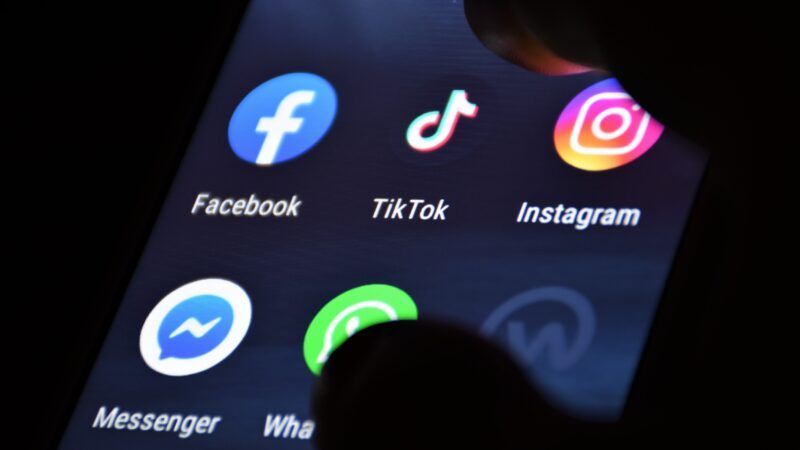The Feds Roll Back Their Influence Over NPR Only To Claim Greater Influence Over TikTok
Politicians' interest in controlling the content you see shifts from public media to social media.

For decades, Republicans threatened to defund the Corporation for Public Broadcasting (CPB) only to stay those cuts in exchange for more conservative-friendly programming.
It was a surprisingly libertarian twist this month, then, when the Republican-controlled Congress passed the White House's recission bill that eliminated funding for the CPB—an institution that subsidizes National Public Radio (NPR), the Public Broadcasting Service (PBS), and their local affiliates, among other operations.
As noncommercial broadcasting adjusts to a world without federal subsidies, the Trump administration is trying to force a sale of the social media company TikTok's U.S. operations from its China-based owner ByteDance to a new consortium of American investors.
U.S. Commerce Secretary Howard Lutnick told CNBC recently that "Americans will have control. Americans will own the technology, and Americans will control the algorithm."
The forced sale of TikTok's American operations is required by a law passed last year forbidding any company from distributing, maintaining, or updating a "foreign adversary-controlled application" within the U.S.
To prepare for that sale, TikTok is reportedly preparing an American version of the app.
"The new app is expected to use only data from U.S. users to train its recommendation algorithms, further distancing it from TikTok's global systems," reports Reuters. "As a result, most users will be recommended content generated within the U.S.,"
So while American taxpayers' dollars won't be going to the new American TikTok in the way they once flowed to public radio, the U.S. government's forced sale of the app will nevertheless have a major influence over the content that American TikTok users will see.
As Reason's Jesse Walker noted in a recent piece on the history of funding fights over public media, "it is not unprecedented for a president who hates much of the media to deploy big government as a weapon in one moment and to pull government back in the next."
To be clear, the Trump administration's effort to orchestrate a sale of TikTok to American investors is downstream of a congressional mandate. Indeed, the administration arguably acted illegally by not already forcing the still-ByteDance-owned TikTok to shut down.
But it has still landed in a paradoxical position. Its successful push to defund the CPB has withdrawn government influence over one form of media. Its forced sale of TikTok's American operations is simultaneously expanding government influence over another form of media.
Given how many more people use TikTok than listen to NPR, Washington's net influence over the media that people consume is growing, not shrinking.
One can't help but wonder whether Republicans' willingness to cut public radio subsidies, as opposed to influence its content in a more conservative direction, is a tacit recognition that radio and TV matter less than they used to. Social media is where the eyeballs are now, and that's where politicians are most interested in influencing what those eyeballs see.
The libertarian case for defunding public media was always quite straightforward: a free press requires voluntarily supported media outlets.
Government subsidies inherently compel speech. They require taxpayers to support media they don't consume (or, in the context of liberal-leaning public radio, that they might object to), and they give politicians more influence over the programming decisions of nominally independent outlets.
Neither outcome is particularly good if you're for people saying and reading what they want without the influence of the state. That's what the "free" in free press is supposed to mean.
A truly free media environment demands freedom from government influence over content. That's not the world we live in, even if the CPB no longer receives federal subsidies.
Rent Free is a weekly newsletter from Christian Britschgi on urbanism and the fight for less regulation, more housing, more property rights, and more freedom in America's cities.
Editor's Note: As of February 29, 2024, commenting privileges on reason.com posts are limited to Reason Plus subscribers. Past commenters are grandfathered in for a temporary period. Subscribe here to preserve your ability to comment. Your Reason Plus subscription also gives you an ad-free version of reason.com, along with full access to the digital edition and archives of Reason magazine. We request that comments be civil and on-topic. We do not moderate or assume any responsibility for comments, which are owned by the readers who post them. Comments do not represent the views of reason.com or Reason Foundation. We reserve the right to delete any comment and ban commenters for any reason at any time. Comments may only be edited within 5 minutes of posting. Report abuses.
Please to post comments


C is for Cancelled
It's not fascism when Trump does it.
The Sale of TicTok legislation was passed during the Biden Administration.
So I'm sure you won't mind if he E.O.'s over it Huh?
UR such a running TDS joke.
Unlike you I judge right and wrong based upon what, not who. Something you can never understand, because that would require principles instead of Trump worship.
You precisely judge WHO-Trump for what Trump didn't even do.
You're not fooling anyone with your Self-Projection and Self-Proclaimed virtue but yourself.
...because UN-funding indoctrination is same, same as having only American owned social media.
I think it's a "boaf sidez" trying to control the press BS but the Reason (Love Foreign not Domestic) spin on it is even more BS than that.
A) Are you a retard?
B) Is the CCP our greatest enemy on the planet?
C) Should we allow our greatest enemy on the planet to propagandize our populace, most notably our young?
D) Is there any distinction between the CCP, who would like to see us turned to dust, and American social media companies who have a pretty vested interest in our continued success?
If you answered "No" to B, C or D, make sure to put a big, retarded "Yes" next to A.